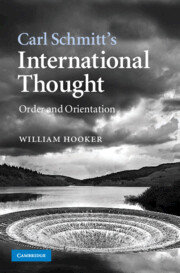Book contents
- Frontmatter
- Contents
- Preface
- Chronology of Schmitt's life
- 1 Introduction
- 2 Schmitt's ‘international thought’
- 3 Unravelling sovereignty
- 4 Histories of space
- 5 Acceleration and restraint
- 6 Großraum
- 7 Partisan
- 8 Conclusion
- Appendix. Carl Schmitt in international relations: a bibliographic essay
- Bibliography
- Index
2 - Schmitt's ‘international thought’
Published online by Cambridge University Press: 29 March 2010
- Frontmatter
- Contents
- Preface
- Chronology of Schmitt's life
- 1 Introduction
- 2 Schmitt's ‘international thought’
- 3 Unravelling sovereignty
- 4 Histories of space
- 5 Acceleration and restraint
- 6 Großraum
- 7 Partisan
- 8 Conclusion
- Appendix. Carl Schmitt in international relations: a bibliographic essay
- Bibliography
- Index
Summary
The ‘arrival’ of Schmitt as an object of interest to those engaged in the mainstream study of international political theory is hardly a surprise. Chris Brown notes that ‘it is striking that there are so few good studies of “the state and IR”’. It is precisely this nexus that dominates Schmitt's political thought as a whole. His interest in the historically conditioned nature of the state, the theoretical grounds of political interaction, the social meaning of warfare and the philosophical basis of political obligation all point towards a basic consideration of the theory of the state. It is impossible to give a full overview of Schmitt's political thought as a whole within these pages, and besides, numerous studies of that nature already exist. Our purpose instead is to sketch out the meaning of ‘Schmitt's international thought’ and to locate the key concepts and historical interpretations that characterise Schmitt as an international theorist.
In the non-German-speaking world, Schmitt's reputation is largely founded on his work of 1932, The Concept of the Political. Although this small, brilliant, polemical work is arguably the most important distillation of Schmitt's political theory, the prominence of this one volume tends to distract from the huge quantity and range of his work over time. As interest in Schmitt has grown, the range of literature available in English has continued to grow, and the recent translations of The Nomos of the Earth and Theory of the Partisan by Gary Ulmen, and the reissue of George Schwab's translation of Political Theology by MIT Press are to be welcomed.
- Type
- Chapter
- Information
- Carl Schmitt's International ThoughtOrder and Orientation, pp. 11 - 33Publisher: Cambridge University PressPrint publication year: 2009



